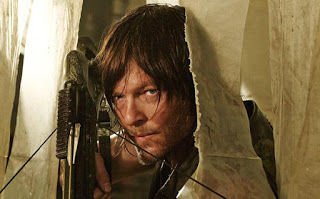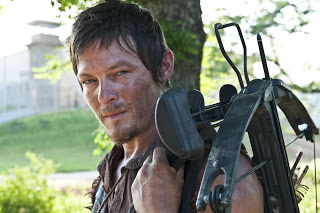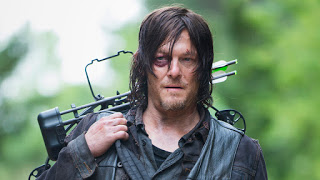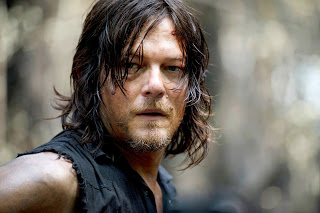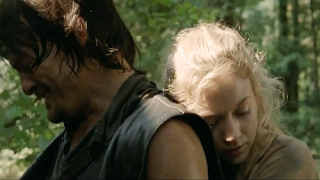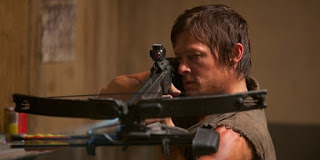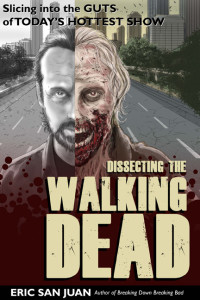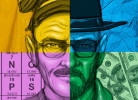The following is an excerpt from Dissecting The Walking Dead: Slicing Into The Guts of Television’s Hottest Show, available in paperback and for Kindle.
Robert Kirkman insists no one is safe on The Walking Dead, but we know better than that. Rick Grimes isn’t going anywhere any time soon. It is, after all, Rick’s show.
But there is a second exception to the unspoken “no one is safe” rule: Daryl Dixon.
While it’s entirely possible the show’s writers can make this author look like an idiot before the ink on this book is even dry, it’s safe to say it’s a longshot. Daryl is such a fan favorite, a character who boasts fierce loyalty from his legion of fans, that the show runners surely must realize they’d see a mass exodus of viewers if Daryl were to bite the big one.
To say that fans have taken to the character would be putting it mildly. Norman Reedus has won a following that at times borders on insane. Rolling Stone pointed out, “Fan drawings of him paper Reedus’ trailer walls, and on the desk is a gelatinous breast implant one woman sent. Reedus uses it as a phone cradle.” While being interviewed for the magazine, he showed off a crotch photo he received from one female fan. “I just read it. It’s basically like, ‘I love you. I’ll wait for you. I’m doing anything to find you.’ … Holy fuck.”
It’s flattering, perhaps, but can also get a little unhinged. He has been followed home multiple times now. One woman who was obsessed with finding him abandoned her kids in a shelter and broke into houses looking for him. Another guy was found in the actor’s backyard. Since starting in the show, Reedus has moved several times, each move bringing him somewhere a little more secluded than his last residence.
It’s not because he doesn’t appreciate the attention. In fact, Reedus has a reputation for being great with his fans. It’s because a very small segment of those fans don’t seem to understand boundaries.
While it’s hard to grasp that level of single-minded, law-breaking fandom, it’s not hard to understand why fans love Daryl so much. On the surface he’s a one-dimensional character – the rough, capable outdoorsman loner cliché – but beneath the surface he’s one of the most complex characters on the show, layered and nuanced and brought to life by an actor who is responsible for making the character what he has become.
Throughout the show, Reedus makes subtle choices that speak volumes. In season four, for instance, when Daryl and Beth are together, there is a moment when a worried Beth is picking berries. Daryl reaches out to give her a bandana in which to hold them, but he never gets close when he does. Instead, he leans in from beyond arm’s reach as if frightened of getting close to her.
And in fact, that’s exactly what’s happening in his head. She’s young and vulnerable; she needs him. He doesn’t want to open himself up to someone as sweet and pure as Beth, and he certainly doesn’t want her relying on him. He knows it can only end in heartbreak. To try and get that across in dialogue would be clunky and obvious. Reedus manages to do it with nothing more than body language.
“At first glance he’s little more than an uneducated redneck. He hurls racial insults, shouts when offered emotional support, and doesn’t hesitate to rough someone up. But it’s all about the nuances. Reedus adds some rather subtle layers to Daryl that only deepen as the show progresses.”
Daryl’s introduction is brash and bold, and a far cry from the character he’d become. He struts out of the woods after a hunting expedition and immediately starts mouthing off. He berates Dale, then quickly gets into an altercation with Rick and Shane.
At this juncture, the show’s writers probably had no idea he would become a fan favorite, if not the fan favorite. The Daryl of the first season is rude and crass and itching to fight at any time. He’s almost as much of a loose cannon as his brother, and is just as much a motormouth (in stark contrast to the silent stalker he’ll later become). He’s unlikable at first. The hints of humanity we see in him, the glimpses of vulnerability that end up coming to define the character, come from Reedus. They are inherent to him, and in turn became part of Daryl.
Daryl’s transformation from backwoods bigot to hero begins with a small but notable scene in the season two opener. The group is caught unaware on the highway by a zombie herd. T Dog has slashed open his arm and is bleeding out. The zombies are about to fall upon him. Daryl slips onto the scene, kills one of the walkers, then puts T Dog in a position of safety before ensuring he himself is in a safe spot.
Putting others before himself? Already, we can see that Daryl is a different sort of man than he was in the first season.
But it’s his dedication to finding Sophia that transforms him once and for all. Throughout the season he is single-minded; devoted. He shows a care and concern for Carol that others do not, revealing a compassion that seems contrary to his gruff, I’m In This All Alone exterior. When he finds evidence that Sophia may still be alive, he brings a Cherokee Rose to Carol. He tells her a story about the Native Americans being led along the Trail of Tears. Mothers lost their children on the trail to hunger and disease and worse, so the tribal elders prayed for a sign that would uplift the mothers’ spirit. The next day, Cherokee Roses grew where the mothers’ tears had fallen.
“I believe this one bloomed for your little girl,” he tells her.
For all his snapping at Rick and the others, pretending he’s only with the group as a matter of necessity, it’s clear that he is coming to care for these people. Getting close to them is in many ways a matter of rebellion for Daryl, because it’s in stark contrast to the life he appears to have led with his brother, Merle.
His relationship with Merle is first explored with some degree of depth in a series of hallucinations Daryl has while injured in the forest. During this sequence, he has a crossbow bolt stuck in his side. He’s losing blood. A vision of Merle appears, taunting him, mocking his pain. “All them years I spent trying to make a man of you,” Merle says, “look at you, lying in the dirt like a used rubber.”
Daryl is forced to confront his relationship with his brother and, more importantly, his decision to leave Atlanta with the group rather than stay behind and find Merle. The vision tells him no one will ever care for him like Merle will, then it transforms into a (real) walker. The symbolism is clear: his relationship with Merle can consume him if he lets it. It’s rotten to the core; corrupted.
“You never took care of me. You talked a big game but you was never there,” he tells a later vision of Merle.
Daryl clearly needs others in his life. He needs to know people care for him and he wants to have people to care for, too.
In fact, Daryl is deeply emotional, arguably the most deeply emotional character on the show. The rub is, he’s frightened to give in to those emotions. It’s a classic case of a guy who engages in puffed up machismo in order to avoid emotional pain.
After Sophia is found dead, for instance, he retreats back into his own head, going to the other side of Hershel’s farm to be alone. Lori comes to him at one point, asking if he’ll go into town to bring back Rick. He shouts that he’s done looking for people. He postures as if he just doesn’t want to be taken advantage of, but the truth is that he doesn’t want to hurt anymore. He allowed himself to become emotionally invested in finding Sophia, even subconsciously turning his back on his brother to do it, and the pain of realizing his efforts were for naught was too much to bear.
Or rather, it was too much like the pain he had felt most of his life. His family background is left largely vague, but the bits and pieces we get paint a picture of a boy with a rough childhood, raised in a family that abused him. If Merle is any indication, displays of empathy or emotions other than anger were looked down upon and punished with ridicule or violence. Because of this, he’s been suppressing such feelings his whole life. He almost opened himself to them through Sophia and Carol, but he chose the pain he is used to – isolation, blind anger, lonely frustration – over the pain he’s never really confronted. He was raised to lash out, so lash out he does.
When Carol shows compassion towards him after Sophia’s loss, the only way he knows how to react to it is to push her away with vile words. “If you spent half your time minding your daughter’s business instead of sticking your nose in everybody else’s she’d still be alive,” he tells her. It’s incredibly cruel, but Carol understands what is really behind his outburst. When she refuses to respond to him, Daryl reveals what it’s all about without realizing he’s doing it: “What, are you going to make this about my daddy or some crap like that?”
He rips into Carol for Sophia’s death but in reality he’s talking about himself: “You’re afraid. You’re afraid ‘cause you’re all alone. Got no husband, no daughter. You don’t know what to do with yourself. You ain’t my problem. Sophia wasn’t mine! Why didn’t you just keep an eye on her!”
Rugged, rough, a little bit dangerous, and made up of emotions piled atop emotions? No wonder his fans are as devoted as they are.
Even for the more casual fan there is a lot to like. Daryl is shrewd, more so than he lets on. We see his tracking and outdoorsman skills during the hunt for Sophia, but while they’re impressive, we’ve seen the skilled outdoorsman trope in a million other stories. More impressive is how easily he reads people and situations. When Shane returns from a supply run and tells the others about Otis being killed, for instance, everyone but Dale believes his story, and Dale’s doubts are rooted in part because Dale just plain doesn’t like or trust Shane. Later, Daryl reveals to Dale that he figured out Shane killed Otis right from the start. Shane told a tale about Otis laying back to cover him, Daryl explains, but he returned with Otis’s gun. He lets the implication linger so that Dale has a “how could we have missed that?” moment: Shane couldn’t possibly have had Otis’s gun if Otis stayed back to cover him. The signs were obvious, and yet Daryl was the only one to see them.
As time goes on, Daryl allows himself to indulge in caring for others, most notably Carol. The writers flirt with the idea of making their closeness romantic, but wisely back off. It’s clear that he cares deeply for her, though.
At one point Carol goes missing inside the prison, for instance, after walkers got loose inside. The fact that she is missing eats at him. He prowls the dark corridors in the hopes of discovering her fate. Losing her would devastate him in a way that not even losing family would, so the moment when he finds her and brings her to safety is a rebirth for him. It’s a realization that he can still hope.
For a guy who has never before dared to hope, that’s a powerful thing.
“It’s a very tight bond those two have,” Reedus says. “There’s a mutual respect for each other. Carol’s a different person now. Daryl sort of leaned on Carol at times and I think Carol sort of leans on Daryl at times. A very interesting partnership right there.”
The assault on Woodbury and Daryl realizing his brother is still alive and near is another major crossroads for him. When he hears Merle is nearby, he insists on going after him; he even says he might be able to talk to him, maybe to establish some peace between his friends and the people of Woodbury. In his heart he knows the idea is foolish – Glenn and Maggie have clearly been tortured and he knows it – but Daryl is a fiercely loyal person, even to a brother he knows can only be a negative force in his life.
After the pair are finally together again, Daryl makes clear he’s no longer the weak brother in the relationship when he rescues some other survivors against Merle’s wishes. Merle doesn’t want to help them, but Daryl leaps ahead anyway. After the rescue, Merle attempts to rob the surviving family as a forced “thanks.” Daryl stops him at crossbow point.
He may be the younger brother, but he’s not the little brother anymore.
Merle taunts him: “Helping someone out of the goodness of your heart even though you might die doing it, is that something your Sheriff Rick taught you?”
This prompts an argument that reveals an important part of both their pasts: Daryl was abused by his father as a child. His back is lined with scars from the beatings. Merle didn’t know Daryl suffered at their father’s hands, too. Seeing his brother’s scars reveals a brief moment of empathy in Merle. He says had he known, he would have taken Daryl with him when he left home.
This time it’s Daryl who leaves, forging out into the forest to return to the people at the prison. Merle says he can’t go with him – not after trying to kill Michonne and torturing Glenn – but Daryl goes anyway and leaves his brother behind.
Merle is forced to follow. Finally, the younger has usurped the elder.
Later, after Merle’s brief dalliance with heroism kills him, Daryl encounters Merle as a walker and weeps. It’s the rawest show of emotion (that isn’t anger) we see from him, matched only by his reunion with Carol after the events at Terminus.
During his time with the group he allows himself to grow closer to people. He’s all but forced to grow closer to Beth when the two of them end up together after the final attack on the prison. That closeness proves a danger to him because it allows him to believe there is still good left in the world. When Beth’s life is snuffed out, so is that hope.
“I think it puts him into a depression,” Reedus told The Hollywood Reporter. “It was different. She was the bright hope of the future. It was an honest and true person.”
Later, in Alexandria, Aaron recognizes Daryl’s need to believe there are still decent people in the world and asks him to go on the road with him to recruit new people into the community. “You do know the difference between a good person and a bad person,” Aaron tells him, showing that Daryl’s good character is no longer a secret despite his reclusive nature.
His past still haunts him, though. Others may see him as a hero, but Daryl still sees himself as low-class trash from a low-class family. Alexandria in particular intimidates him. These people seem pure and clean. They come from backgrounds he can neither understand nor relate to, so he once again retreats back into the solitude he knows so well.
It’s perhaps not a prudent choice, but the writers of the show know better than to tinker too much with what makes Daryl resonate so strongly with people.
The character gained huge popularity with that sensitive loner image, so the show creators are happy to indulge in choices that enhance the image even when those choices make little sense in the context of trying to survive the apocalypse. For example, “even when he starts to become closer to the team he still rides his motorcycle alone even if there’s plenty of room in the other cars. It’s a bit inefficient in a post-apocalyptic world short on fuel, but it certainly makes for entertaining symbolism.”
It’s exactly because of the Cool At All Cost way in which the show handles Daryl that some critics suggest the character should be written out of the show. Slate, for example, argues that The Walking Dead’s treatment of Daryl has been shallow at best, an endless cycle of loss that allows them to never stray from writing him as a distant, vaguely mysterious bad boy.
Discovering Sophia was dead could have been a soul-baring moment, but it never happened. Sure, it made sense that the writers would want to maintain Daryl’s air of mystery for as long as possible. But this pattern of love, lose, repeat is basically the only storyline he gets every season—while the trauma has no recognizable impact on his closed-off demeanor. Even having to kill the zombified resurrection of his older brother, Merle, in Season 3 was not enough to crack Daryl open. Neither was finding out that Carol, one of his closest friends in the party, had been banished from the prison—an apparent death sentence. So at this point, Daryl’s mysteriousness has become a crutch that the writers use to justify his flatlining character development.”
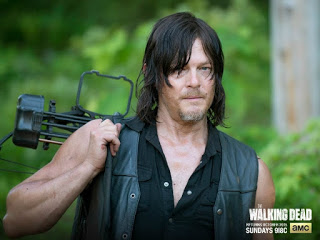 For what it’s worth, this author does not agree with that assessment. While it’s true that they’ve repeated the same cycle over and over with Daryl – he lost his brother, Sophia, his brother again, Carol (temporarily), and finally Beth – the charge that the character hasn’t grown or evolved fails under scrutiny. This is a character who went from a raging, angry loner to a person with layers to unpeel. As Carol tells him after their emotional reunion following her brief banishment, “You were a kid. Now you’re a man.”
For what it’s worth, this author does not agree with that assessment. While it’s true that they’ve repeated the same cycle over and over with Daryl – he lost his brother, Sophia, his brother again, Carol (temporarily), and finally Beth – the charge that the character hasn’t grown or evolved fails under scrutiny. This is a character who went from a raging, angry loner to a person with layers to unpeel. As Carol tells him after their emotional reunion following her brief banishment, “You were a kid. Now you’re a man.”
His emotional scars have created a figurative callous that makes it difficult to get close to him, but thanks in part to what Reedus brings to the table, Daryl is one of the show’s richest characters. Through him, we explore the difficulty of connecting with others, the scars childhood abuse leaves on a person, and the idea that the family you choose is more important than the family you’re given. Eliminating him would not only get the fans in an uproar, it would be a genuine loss for a show in need of characters with complexity.
That, and his crossbow is pretty damn cool.

